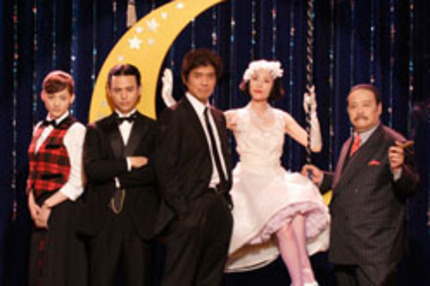NYAFF 09 Review: THE MAGIC HOUR


[Our thanks to Christopher Bourne for the following review.]
Koki Mitani’s latest film The Magic Hour is an entertaining and beautifully designed tribute to movies and movie-making that revels in its artificiality. Early in the film, Natsuko (Haruka Ayase), a nightclub waitress, remarks that the elements of the story – gangsters, guns, cement overshoes, a boss’ moll – all make the town seem like a movie set. At the film’s outset, nightclub manager Bingo (Satoshi Tsumbuki) has run afoul of yakuza boss Teshio (Toshiyuki Nishida) by having an affair with the boss’ girlfriend Mari (Eri Fukatsu). Bingo saves them both from being the proverbial feed for the fishes by claiming to be an acquaintance of Della Togashi, a famous hit man known as the “Phantom Assassin,” whom Teshio would like to meet. Not actually knowing the assassin at all, and unable to find the real deal, he comes up with the idea of asking Murata (Koichi Sato), a stuntman, bit part actor, and aspiring star player, to stand in for the assassin. Bingo must keep up a double ruse, convincing Teshio that the actor is the hit man, and also making Murata believe he is in a film. The film’s scenario echoes other films such as Bowfinger and, more recently, Tropic Thunder, in which much humor is mined from the idea of tossing actors unknowingly into dangerous real-life situations. All the complications that one would expect, and then some, ensue. All the visual elements of this film – its cinematography, production design, and canny recreations of old movies – are top notch, as are the spirited performances of its cast, especially Koichi Sato, Eri Fukatsu, and Haruka Ayase.
The Magic Hour is an immensely pleasing homage to 1930’s and 1940’s Hollywood screwball comedy, a mode familiar to this popular film and stage director, and a hallmark of his previous films, such as Welcome Back, Mr. McDonald (1997) and The Wow-Choten Hotel (2006). The film’s spirit of movie love is quite infectious, and it ultimately becomes an endearing ode to cinema, reinforced by the presence of the late, legendary Japanese director Kon Ichikawa in a cameo. The film’s very title is a film term, referring to the time just before sunrise or sunset in which there is an especially aesthetically pleasing quality to the light that makes anything filmed at that time ethereally beautiful. (Perhaps the most celebrated film associated with this time of day is Terence Malick’s Days of Heaven.) As movie-obsessed as The Magic Hour is, there is also a very theatrical feel to the film, which makes sense given Mitani’s experience directing for the stage. Mitani is an unabashed acolyte of Billy Wilder, and this is very evident in the high farce the film indulges in, which reaches ever more absurd proportions as the film progresses. If there’s any fault to be found in this film, it’s in its overabundance of riches – its huge all-star cast, the multiple twists and complications of its scenario – that make The Magic Hour an overstuffed cornucopia that Mitani has a little trouble sustaining over its two hour-plus length. Nevertheless, the film was deservedly a massive hit upon its release in Japan last summer, solidifying Mitani’s status as a unique comic auteur.
The Magic Hour, a co-presentation of the New York Asian Film Festival and the Japan Cuts Festival of New Japanese Film, screens at Japan Society on July 5 at 12pm.
Review by Christopher Bourne







